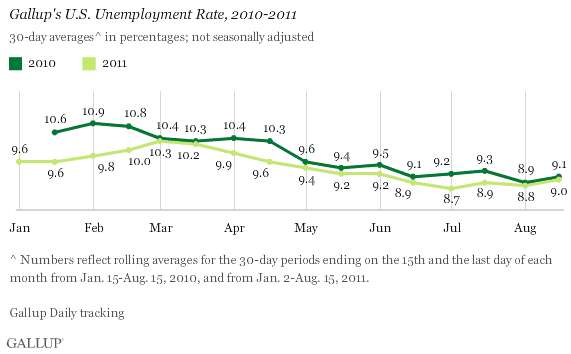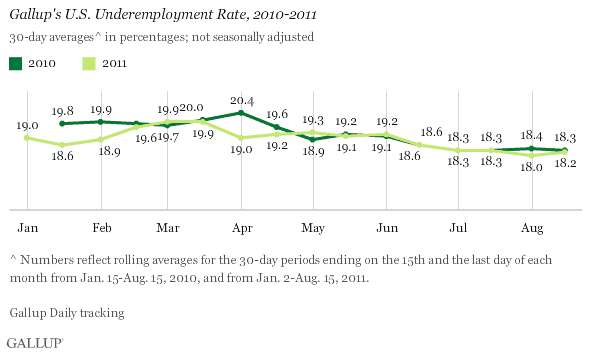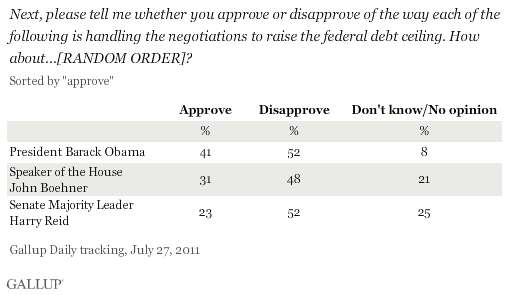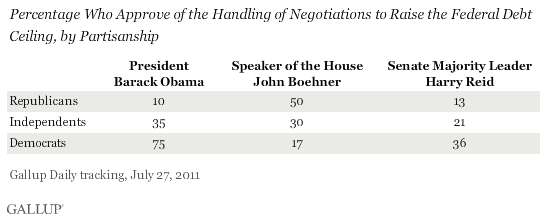-
Photo of the Day: Obama Goes On Vacation While Unemployment Claims Climb
 Matt Drudge is giving President Obama the Herbert Hoover treatment but……
Matt Drudge is giving President Obama the Herbert Hoover treatment but……
Jobless Claims in U.S. Top ForecastMore Americans than forecast filed applications for unemployment benefits last week, signaling the labor market is struggling two years into the economic recovery.
Jobless claims climbed by 9,000 to 408,000 in the week ended Aug. 13, the highest in a month, Labor Department figures showed today in Washington. Economists surveyed by Bloomberg News projected a rise in claims to 400,000, according to the median forecast. The number of people on unemployment benefit rolls rose, while those receiving extended payments fell.
Companies like Bank of New York Mellon Corp. (BK) are paring staff, one reason consumers are limiting their spending, which accounts for about 70 percent of the economy. Unemployment at 9.1 percent helps explain why Federal Reserve policy makers last week pledged to hold interest rates at a record low until at least mid-2013 to spur growth.
“People continue to get laid off,” David Semmens, a U.S. economist at Standard Chartered Bank in New York, said before the report. “The uncertainty in the economic outlook is continuing to give hiring managers sleepless nights and is keeping businesses from expanding. We have an incredibly long way to go” to get a healthy labor market, Semmens said.
Mr. President, a new jobs speech/program in September is too little and way too late.
-
Poll Watch: American Unemployment Rate Up to 9.1% in Mid-August

According to the latest Gallup Poll.Unemployment, as measured by Gallup without seasonal adjustment, is 9.0% in mid-August — compared with 8.8% at the end of July and 9.1% in mid-August 2010.
In the meantime, underemployment as measured by Gallup shows some modest improvement.
Underemployment, a measure that combines the percentage of workers who are unemployed with the percentage working part time but wanting full-time work, is 18.2% in mid-August — compared with 18.0% at the end of July and 18.3% in mid-August 2010.
The chart:

The youngest and oldest workers continue to struggle in the economy. Also, the less educated.
One worrisome aspect of the current situation is that the U.S. economy simply has not been growing fast enough — as reflected in first half GDP — to create the number of new jobs necessary to meet population growth, let alone significantly reduce the unemployment rate. This is consistent with Gallup’s finding that unemployment now is essentially no better than it was at this time in 2010.
In particular, it appears Americans 65 or older who want to continue to work are having more of a problem finding a job than they did a year ago. Unemployment among this group increased to 8.2% this year from 6.7% a year ago. It may be that more baby boomers want to or need to keep working as they reach retirement age. Or, the losses on Wall Street over the past couple of years may be making many older Americans postpone retirement. Whatever the reasons, the job situation facing older Americans seems to be deteriorating.
At the other end of the age spectrum, unemployment hovers around the 12% level among those aged 18 to 29 (at 12.4% in mid-August, up from 11.9% a year ago) and among those with a high school education or less (11.9%, vs. 12.0%). Continued high unemployment among these two groups supports the notion that the prolonged and historically high unemployment rates of the past several years signify a serious structural unemployment problem in the U.S.
And, regionally employment in the Eastern part of the United states appears to have deteriorated from a year ago. It is unchanged in the South while unemployment has declined in the West and Midwest.
So, what are the implications?
President Obama and incumbent Members of Congress are looking for improving employment numbers. They are not and remember NO incumbent President has been re-elected with a national unemployment figure above 8 per cent, unless the trend like in the Reagan years is demonstrably improving.
The economy is stagnant and unemployment is NOT improving.
A danger sign for incumbent POLS, particularly with Senior Citizen voters who DO turn out and VOTE.
-
President 2012: Obama Offers Up His Excuses on Why the American Economy Sucks

President Barack Obama speaks during a town hall meeting, Monday, Aug. 15, 2011, at the Seed Savers Exchange in Decorah, Iowa, during his three-day economic bus tour
Unbelievable – I mean really.At a town hall meeting on his campaign-style tour of the Midwest, President Obama claimed that his economic program “reversed the recession” until recovery was frustrated by events overseas. And then, Obama said, with the economy in an increasingly precarious position, the recovery suffered another blow when Republicans pressed the White House for federal spending cuts in exchange for an increase in the national debt limit, resulting in a deal Obama called a “debacle.”
“We had reversed the recession, avoided a depression, gotten the economy moving again,” Obama told a crowd in Decorah, Iowa. “But over the last six months we’ve had a run of bad luck.” Obama listed three events overseas — the Arab Spring uprisings, the tsunami in Japan, and the European debt crises — which set the economy back.
“All those things have been headwinds for our economy,” Obama said. “Now, those are things that we can’t completely control. The question is, how do we manage these challenging times and do the right things when it comes to those things that we can control?”
Isn’t Obama really saying: Vote for me because things were out of my hands and without me the economy could be a lot worse?
This pig is NOT going to fly, Mr. President.
-
The White House and GOP Have Reached a Tentative Deal on the Debt Limit
ABC News has learned that Republicans and the White House have struck a tenative deal to raise the debt ceiling before the Aug. 2 deadline. It’s not done yet, but here is the framework of the tentative deal they have worked out, according to a source familiar with the negotiations:
Debt ceiling increase of up to $2.8 trillion
Spending cuts of roughly $1 trillion
Vote on the Balanced Budget Amendment
Special committee to recommend cuts of $1.8 trillion (or whatever it takes to add up to the total of the debt ceiling increase)
Committee must make recommendations before Thanksgiving recess
If Congress does not approve those cuts by late December, automatic across-the-board cuts go into effect, including cuts to Defense and Medicare.A senior White House aide pushed back against the idea that a deal was struck.
“Talks continue, but there is no deal to report,” the aide said.
There is some push back from Democrats and Republicans on Twitter.
Senate majority leader Harry Reid has postponed a vote on his plan in the Senate until 1 PM (EDT) tomorrow.
Stay tuned…..
-
Why the Boehner Debt Limit Plan MUST Fail
I guess I have had a change of heart.
House conservatives should vote NO today on the Boehner Plan and Eric delivers the rationale.
-
Poll Watch: Obama Fairing Better than Boehner and Reid on Debt Limit Debate Although All Are Negative
 According to the latest Gallup poll.
According to the latest Gallup poll.Americans are more likely to approve of the way President Obama is handling the negotiations to raise the federal debt ceiling than they are to approve of the handling of the situation by Speaker of the House John Boehner or Senate Majority Leader Harry Reid, although opinions about all three are more negative than positive.
These results are from a special one night USA Today/Gallup poll conducted July 27, as Speaker Boehner was marshaling support for Thursday’s House vote on his version of a new budget plan.
President Obama’s 41% approval rating on handling the situation is 10 percentage points higher than Boehner’s and 18 points higher than Reid’s. However, more Americans have an opinion about Obama’s handling of the situation than is the case for the other two men, so when those with no opinion are factored out of the results, Obama’s advantage is lessened. Among those with an opinion about his handling of the situation, the president has 44% approval and 56% disapproval, compared with 39% and 61% for Boehner and 31% and 69% for Reid.
Americans are saying a POX to all of the POLS.
But, Boehner does NOT have the support of the rank and file GOP. Only half of the Republicans approve of Boehner’s handling of the debt situation and 75 per cent of the Democrats approve of Obama’s handling of the situation.
What about independent voters?

And, Tea Party supporters?
A Third of Tea Party Supporters Disapprove of Boehner’s Handling of SituationTea Party supporters have been among the most vocal participants in the current debt crisis debate. Many observers suggest that the pressure Tea Partiers are putting on newly elected freshman Republican House members is a reason the parties have not been able to strike a debt agreement so far. House Speaker Boehner is attempting to broker a deal to get the debt ceiling raised while at the same time reflecting the intense sentiments of Tea Party followers.
Boehner does slightly better among all Tea Party supporters — 61% approval and 33% disapproval — than he does among all Republicans — 50% approval and 35% disapproval. These differences reflect the fact that in this survey, less than half (46%) of Republicans identify as Tea Party supporters, and that this group has a much different view of Boehner’s efforts on the debt situation than those who are not Tea Party supporters. Republicans who support the Tea Party approve of Boehner’s handling of the debt situation by 65% to 30%, while Republicans who are not Tea Party supporters split evenly, 38% approve and 40% disapprove, with the rest having no opinion. This difference is significant despite the smaller sample sizes involved, and suggests that Boehner is having more trouble pleasing the moderate and liberal wing of his party than he is the conservative wing.
So, what does this all mean?
Americans are not approving of any of the parties or POLS. It may be too early to assess the true impact of the situation, unless some financial crisis results. But, for election 2012, this entire matter is a negatve for both sides of the aisle. If anyone thinks the President can claim a victory in this situation, they better read and weep.
Both sides are likely to cut a deal now that it is very apparent, they are both losing the public perception.
It is too early to determine the long-term impact of the current debt ceiling crisis on the political fortunes of President Obama, Speaker Boehner, Majority Leader Reid, and the other politicians who have been in the middle of the unfolding drama. The current short-term data suggest that to date none of those involved receive glowingly positive reviews from the American public. More Americans disapprove than approve of the way Obama, Boehner, and Reid have each handled the situation.
Obama does better than the other two, based in large part on the high approval rating he receives from his fellow Democrats. Boehner receives significantly less loyalty from Republicans, half of whom approve of his handling of the situation. This no doubt reflects the current divisions within the Republican Party, with conservatives and Tea Party supporters pressing for a rigid stance against compromise and tax increases, while other Republicans are more inclined to push for a settlement with Obama and the Democrats. At this point, the former group is the most supportive of Boehner, which suggests that he faces more problems from the moderate wing of his party than from the conservative Tea Party wing. The fact that as many Republicans who do not support the Tea Party say they disapprove of how Boehner is handling the situation as say they approve highlights his leadership challenges.
-
Harry Reid Says Senate Will Defeat Boehner Debt Limit Plan Tonight – Then What?
Then, the deal making will begin.
The Senate will take up, and vote down, House Speaker John Boehner’s bill to raise the federal debt ceiling immediately after its anticipated House passage Thursday evening, Senate Majority Leader Harry Reid, D-Nev., said.
“As soon as the House completes its vote tonight, the Senate will move to take up that bill. It will be defeated,” Reid said, citing a letter sent last night to Boehner in which all 53 Democratic Caucus members vowed to vote against the measure if it passes. “No Democrat will vote for a short-term Band-Aid that would put our economy at risk and put the nation back in this untenable situation a few short months from now.”
Boehner was still working to round up votes Thursday. But both parties now expect his measure to narrowly pass over Democratic opposition.
Reid has two options: He could “table” the proposal, postponing its consideration indefinitely, or bring it up for a vote, which would kill the bill directly. The advantage of tabling is that it’s faster. Under the byzantine rules of the Senate, the Majority Leader would have to wait about two days before being able to bring the House bill up for a vote, whereas tabling the bill could take just a day and a half. The disadvantage of tabling is that Republicans will insist that Boehner’s proposal had a chance in the Senate, and that Reid was simply afraid that it would pass. But with the Aug. 2 approaching, Democratic aides think tabling is more likely.
Once Reid kills the bill, there are two new paths he could take: He could bring his own plan up for a vote or he could try to come up with a compromise plan with Boehner and Senate Minority Leader Mitch McConnell.
Since Dingy Harry’s bill has NO chance of passing in the House, the deal making will begin.
But, of course, there will be plenty of blaming the other side and at the last minute there will be a deal or the August 2nd deadline passes which will probably prove to be a non-event.
-
Video: Obama at Fault if There is a No Debt Ceiling Deal
There will be a deal as the House GOP WILL pass the Boehner Plan this afternoon.Dick Morris explains why this is a good deal for the GOP.Watch it all. -
Poll Watch: 70% Say Debt Ceiling Will Be Raised – 42% Say Long Term Government Spending Will NOT Be Reduced
According to the latest Rasmussen Poll.
With less than five days left until the federal government could begin defaulting on its debts, voters continue to express unhappiness with both sides of the debt ceiling debate. While most voters continue to believe the debt ceiling will be raised before the government defaults, most don’t think the president and Congressional Republicans will agree on significant long-term spending cuts before the 2012 elections.
The latest Rasmussen Reports national telephone survey of Likely Voters shows that 70% believe it’s at least somewhat likely that the debt ceiling will be raised before the government begins defaulting on its debts. Only 18% don’t think the debt ceiling will be raised by Tuesday, while another 12% are undecided. These findings include 33% who say a debt ceiling increase is Very Likely and just three percent (3%) who think it’s Not at all Likely to happen
However, less than half of voters (42%) say it’s likely President Obama and congressional Republicans will reach an agreement to significantly cut long-term government spending trends before the 2012 elections, including just eight percent (8%) who say it’s Very Likely. Fifty-one percent (51%) don’t believe it’s likely the two sides will reach this agreement, including 15% who say it’s Not At All Likely.
Only 35% of voters nationwide approve the way the president and congressional Democrats are handling the debt ceiling debate, while most (61%) disapprove.
Republicans aren’t off the hook either: 38% approve of the way the GOP are handling the debate while 57% disapprove. Voter sentiments about both sides are similar to those found last week.
You can fool some of the people some of the time.
All of the drama and for what?
The Boehner or Reid Plan?
Move on to the 2012 elections because nothing is going to happen until there is a new Senate and/or President.
-
Updated 11 AM EDT: The Boehner Debt-Llimit Plan GOP Whip List
Whipping The Boehner Proposal To Raise The Nation’s Debt Ceiling
The nonpartisan Congressional Budget Office reported Wednesday that House Speaker John Boehner’s revised proposal to raise the debt ceiling deficit reduction plan would reduce budget deficits by about $915 billion over 10 years through FY2021. With the bill slated to hit the House floor Thursday, Boehner is trying to secure the necessary number of votes needed to pass the measure.
A vote originally scheduled for Wednesday was delayed late Tuesday amid disunity within the GOP conference and a previous report from the CBO that Boehner’s plan would accomplish cuts $150 billion below the $1 trillion target House Republicans want.
National Journal has compiled a list of Republican Members who have committed to voting no, and those who have declared they are undecided. We’ve also included the stances of notable yes votes as well as the positions of notable Democrats, based on the recent House vote on the GOP’s “Cut, Cap And Balance” measure. If no Democrats support the Boehner plan, the maximum number of votes the House speaker can lose and still pass the measure is 23. Right now, 19 Members have committed to voting no.
Here is the revised NO GOP List:
NO (19)
Rep. Roscoe Bartlett, R-Md.
Rep. Trent Franks, R-Ariz.
Rep. Louie Gohmert, R-Texas
Rep. Phil Gingrey , R-Ga.
Rep. Jim Jordan, R-Ohio
Rep. Todd Akin, R-Mo.
Rep. Tim Huelskamp, R-Kan.
Rep. Jason Chaffetz, R-Utah
Rep. Michele Bachmann, R-Minn. (multiple news reports)
Rep. Ron Paul, R-Texas
Rep. Joe Walsh, R-Ill.
Rep. Tom Graves, R-Ga. (National Review)
Rep. Jeff Landry, R-La. (National Review)
Rep. Dennis Ross, R-Fla.
Rep. Paul Broun, R-Ga.
Rep. Jeff Duncan, R-S.C. (The Hill)
Rep. Steve King, R-Iowa (The Hill)
Rep. Steve Southerland, R-Fla. (The Hill)
Rep. Chuck Fleischmann, R-Tenn. (Washington Post)LEANING NO (3)
Rep. Tim Scott, R-S.C.
Rep. Trey Gowdy, R-S.C. (The Hill)
Rep. David Schweikert, R-Ariz.